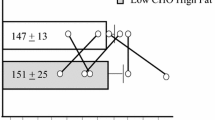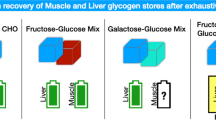Abstract
Athletes are continually searching for means to optimize their performance. Within the past 20 years, athletes and scientists have reported or observed that consuming a carbohydrate-restricted diet may improve performance. The original theories explaining the purported benefits centered on the fact that fat oxidation increases, thereby “sparing” muscle glycogen. More recent concepts that explain the plausibility of the ergogenicity of low-carbohydrate, or high-fat, diets on exercise performance pertain to an effect similar to altitude training. We and others have observed that although fat oxidation may be increased, the ability to maintain high-intensity exercise (above the lactate threshold) seems to be compromised or at least indifferent when compared with consumption of more carbohydrate. That said, clinical studies clearly demonstrate that ad libitum low-carbohydrate diets elicit greater decreases in body weight and fat than energy-equivalent low-fat diets, especially over a short duration. Thus, although low-carbohydrate and high-fat diets appear detrimental or indifferent relative to performance, they may be a faster means to achieve a more competitive body composition.
Similar content being viewed by others
References and Recommended Reading
Feinman RD, Fine EJ: “A calorie is a calorie” violates the second law of therm odynamics. Nutr J 2004, 3:9.
Larosa JC, Fry AG, Muesing R, Rosing DR: Effects of high-protein, low-carbohydrate dieting on plasma lipoproteins and body weight. J Am Diet Assoc 1980, 77:264–270.
Sondike SB, Copperman N, Jacobson MS: Effects of a low-carbohydrate diet on weight loss and cardiovascular risk factor in overweight adolescents. J Pediatr 2003, 142:253–258.
Brehm BJ, Seeley RJ, Daniels SIR, D’Alessio DA: A randomized trial comparing a very low carbohydrate diet and a calorie-restricted low fat diet on body weight and cardiovascular risk factors in healthy women. J Clin Endocrinol Metab 2003, 8:1617–1623.
Foster GD, Wyatt HR, Hill JO, et al.: A randomized trial of a low-carbohydrate diet for obesity. N Engl J Med 2003, 348:2082–2090.
Volek JS, Sharman MJ: Cardiovascular and hormonal aspects of very-low-carbohydrate ketogenic diets. Obes Res 2004, 12(Suppl 2):115S–123S.
Mensink RP, Katan MB: Effect of dietary fatty acids on serum lipids and lipoproteins. A meta-analysis of 27 trials. Arterioscler Thromb 1992, 12:911–919.
Samaha FF, Iqbal N, Seshadri P, et al.: A low-carbohydrate as compared with a low-fat diet in severe obesity. N Engl J Med 2003, 348:2074–2081.
Erlenbusch M, Haub M, Munoz K, et al.: Effect of high-fat or high-carbohydrate diets on endurance exercise: a meta-analysis. Int J Sport Nutr Exerc Metab 2005, 15:1–14.
Nordmann AJ, Nordmann A, Briel M, et al.: Effects of low-carbohydrate vs low-fat diets on weight loss and cardiovascular risk factors: a meta-analysis of randomized controlled trials. Arch Intern Med 2006, 166:285–293.
Haub MD, Wells AM, Campbell WW: Beef and soy-based food supplements differentially affect serum lipoprotein-lipid profiles because of changes in carbohydrate intake and novel nutrient intake ratios in older men who resistive-train. Metabolism 2005, 54:769–774.
Yancy WS Jr, Olsen MK, Guyton JR, et al.: A low-carbohydrate, ketogenic diet versus a low-fat diet to treat obesity and hyperlipidemia: a randomized, controlled trial. Ann Intern Med 2004, 140:769–777.
Yancy WS Jr, Olsen MK, Dudley T, Westman EC: Acid-base analysis of individuals following two weight loss diets. Eur J Clin Nutr 2007, Epub ahead of print.
Burke LM, Cox GR, Culmmings NK, Desbrow B: Guidelines for daily carbohydrate intake: do athletes achieve them? Sports Med 2001, 31:267–299.
Costill DL, Hargreaves M: Carbohydrate nutrition and fatigue. Sports Med 1992, 13:86–92.
Galbo H, Holst JJ, Christensen NJ: The effect of different diets and of insulin on the horm onal response to prolonged exercise. Acta Physiol Scand 1979, 107:19–32.
Jeukendrup AE: Modulation of carbohydrate and fat utilization by diet, exercise and environment. Biochem Soc Trans 2003, 31:1270–1273.
Helge JW, Ayre K, Chaunchaiyakul S, et al.: Endurance in high-fat-fed rats: effects of carbohydrate content and fatty acid profile. J Appl Physiol 1998, 85:1342–1348.
Hurley BF, Nemeth PM, Martin WH 3rd, et al.: Muscle triglyceride utilization during exercise: effect of training. J Appl Physiol 1986, 60:562–567.
Jeukendrup AE, Saris WH, Wagenmakers AJ: Fat metabolism during exercise: a review—part II: regulation of metabolism and the effects of training. Int J Sports Med 1998, 19:293–302.
Kiens B, Essen-Gustavsson B, Christensen NJ, Saltin B: Skeletal muscle substrate utilization during submaximal exercise in man: effect of endurance training. J Physiol 1983, 469:459–478.
Peters SJ, Leblanc PJ: Metabolic aspects of low carbohydrate diets and exercise. Nutr Metab (Lond) 2004, 1:7.
Havemann L, West SJ, Goedecke JH, et al.: Fat adaptation followed by carbohydrate loading compromises high-intensity sprint performance. J Appl Physiol 2006, 100:194–202.
Hickson RC, Rennie MJ, Conlee RK, et al.: Effects of increased plasma fatty acids on glycogen utilization and endurance. J Appl Physiol 1977, 43:829–833.
Rennie MJ, Winder WW, Holloszy JO: A sparing effect of increased plasma fatty acids on muscle and liver glycogen content in the exercising rat. Biochem J 1976, 156:647–655.
Phinney SD: Ketogenic diets and physical performance. Nutr Metab (Lond) 2004, 1:2.
Lambert EV, Speechly DP, Dennis SC, Noakes TD: Enhanced endurance in trained cyclists during moderate intensity exercise following 2 weeks adaptation to a high fat diet. Eur J Appl Physiol Occup Physiol 1994, 69:287–293.
Pitsiladis YP, Maughan RJ: The effects of alterations in dietary carbohydrate intake on the perform ance of high-intensity exercise in trained individuals. Eur J Appl Physiol Occup Physiol 1999, 79:433–442.
Burke LM, Hawley JA: Effects of short-term fat adaptation on metabolism and performance of prolonged exercise. Med Sci Sports Exerc 2002, 34:1492–1498.
Carey AL, Staudacher HM, Cummings NK, et al.: Effects of fat adaptation and carbohydrate restoration on prolonged endurance exercise. J Appl Physiol 2001, 91:115–122.
Pogliaghi S, Veicsteinas A: Influence of low and high dietary fat on physical performance in untrained males. Med Sci Sports Exerc 1999, 31:149–155.
Horvath PJ, Eagen CK, Fisher NM, et al.: The effects of varying dietary fat on performance and metabolism in trained male and female runners. J Am Coll Nutr 2000, 19:52–60.
Muoio DM, Leddy JJ, Horvath PJ, et al.: Effect of dietary fat on metabolic adjustments to maximal VO2 and endurance in runners. Med Sci Sports Exerc 1994, 26:81–88.
Sherman WM, Wimer GS: Insufficient dietary carbohydrate during training: does it impair athletic performance? Int J Sport Nutr 1991, 1:28–44.
Rosenkranz RR, Cook CM, Haub MD: Endurance training on low carbohydrate and grain based diets: a case study. Int J Sport Nutr Exerc Metab 2007, 17:in press.
Brown RC, Cox CM, Goulding A: High-carbohydrate versus high-fat diets: effect on body composition in trained cyclists. Med Sci Sports Exerc 2000, 32:690–694.
Author information
Authors and Affiliations
Corresponding author
Rights and permissions
About this article
Cite this article
Cook, C.M., Haub, M.D. Low-carbohydrate diets and performance. Curr Sports Med Rep 6, 225–229 (2007). https://doi.org/10.1007/s11932-007-0036-5
Published:
Issue Date:
DOI: https://doi.org/10.1007/s11932-007-0036-5




